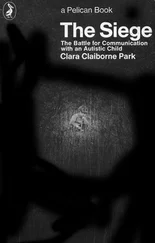Clara Park - Exiting Nirvana
Здесь есть возможность читать онлайн «Clara Park - Exiting Nirvana» весь текст электронной книги совершенно бесплатно (целиком полную версию без сокращений). В некоторых случаях можно слушать аудио, скачать через торрент в формате fb2 и присутствует краткое содержание. ISBN: , Жанр: Психология, на английском языке. Описание произведения, (предисловие) а так же отзывы посетителей доступны на портале библиотеки ЛибКат.
- Название:Exiting Nirvana
- Автор:
- Жанр:
- Год:неизвестен
- ISBN:0-316-69117-8
- Рейтинг книги:4 / 5. Голосов: 1
-
Избранное:Добавить в избранное
- Отзывы:
-
Ваша оценка:
- 80
- 1
- 2
- 3
- 4
- 5
Exiting Nirvana: краткое содержание, описание и аннотация
Предлагаем к чтению аннотацию, описание, краткое содержание или предисловие (зависит от того, что написал сам автор книги «Exiting Nirvana»). Если вы не нашли необходимую информацию о книге — напишите в комментариях, мы постараемся отыскать её.
All illustrations are by Jessy Park.
Exiting Nirvana — читать онлайн бесплатно полную книгу (весь текст) целиком
Ниже представлен текст книги, разбитый по страницам. Система сохранения места последней прочитанной страницы, позволяет с удобством читать онлайн бесплатно книгу «Exiting Nirvana», без необходимости каждый раз заново искать на чём Вы остановились. Поставьте закладку, и сможете в любой момент перейти на страницу, на которой закончили чтение.
Интервал:
Закладка:
Other openers, more elaborate, share some of the enthusiasm of „Guess what!“ „I can’t believe it!“ she’ll say, or „Isn’t it amazing?!“ That’s not a question, though it sounds like one, and it’s not really amazing, even to her. Rather it’s her regular introduction to a matter of consuming interest — a new fluffy-in- the-middle, perhaps, or a fee. Yet the exclamatory tone may communicate only the mildest of surprises: „But couldn’t believe it, they decided to make the fireworks [originally scheduled for eight] at nine!“
She doesn’t need openers for the routine exchanges of daily life; if you’re shopping with her, or working with her in the kitchen, she’ll sound almost normal. „Tomorrow I am going to make Doubly Delicious chocolate cookies“ carries no exclamation point. On such familiar ground, she offers with no hesitation an ordinary, factual communication. There are plenty of these now; it’s more than thirty years since I noted down that for the first time in her life Jessy had told me something I didn’t already know. But other statements sound more normal than they are. I hear Jessy say clearly, definitely, positively, „Jane’s house is in New Jersey“. It sounds like a statement, it’s a statement in tone and form. Yet she doesn’t know where Jane’s house is, and the statement is false. But she has no reason to mislead me, and she is incapable of a convincing lie, so I’m able to guess: this is one of her odd assertions that function as a question. What we do automatically is for her an effort: to shift the verb and noun from „Jane’s house is…“ to „Is Jane’s house..?“; to turn a statement into a question. Jessy knows how to do it; she can do it in writing, taking her time. But in speaking she’ll go for the easier way.
Jessy asks surprisingly few questions; that particular rising tone is rare. She never went through a „why?“ stage; even „when?“ and „where?“ are not among her common openers. When apparent statements function as questions, they are not the questions of curiosity; they are not even requests for information. The assertion is in fact a hopeful hypothesis; it is that particular kind of question that expects a „yes“ answer. „Jane’s house is in New Jersey, isn’t it?“ She’d like it to be there; she has reasons for wanting to go to New Jersey. But instead of dealing with that (it’s a long way), I opt for a speech lesson. „Is that a statement or a question? Are you asking me or telling me?“ I’ve taken a risk, I know. This time she answers calmly, and we talk about other ways she might say it. But sometimes — beware — the lesson hits a nerve. She may bang the table, she may explode into what she and we call a snap. „Why do you ask me that?“ It’s more than a nasty, sharp response. And it’s not a question; it expects no reply. It’s a sound, loud, abrupt, angry, immediate, no openers necessary. The words come out so fast they are scarcely recognizable. This is not communicative speech, it’s a reflex noise. Though we’ve learned the kind of thing that elicits these snaps, that doesn’t mean we understand them. They send us back where we started, into bewilderment.
Other expressions of emotion, however, are only too easy to read. Suppose Jessy is asked, as she often is at work, to interrupt one task and turn to another. She’s learned what she should say and she says it: „I would be happy to“. The tone is not flat; on „happy“ it rises high. Too high; the exaggerated emphasis proclaims she wouldn’t be happy to at all. The disconnect between words and feeling is complete. It’s the sound of insincerity; give it a bit of a twist and it might even be irony. Yet it is neither. Insincerity and irony are beyond Jessy’s powers; for her, language means only what it says. She has learned what is required by the situation, she has said the right words; what more can be expected? Without a theory of other minds, one is unlikely to interrogate one’s own; Jessy doesn’t consider whether she really is happy, or realize her voice conveys not happiness but clear displeasure.
Yet Jessy has a genuinely willing response, a cheerful, relaxed „Sure“. I praise it whenever I hear it, and I hear it often. But at work, where it’s most needed? Shall I coach her, rehearse her to substitute the simple answer that comes out so naturally when feeling is congruent to word? It won’t work. I know already the unnatural grin that results when she’s asked to smile for a photo. If she tries to mimic the tone, her voice will betray her more reliably than any polygraph.
And shall I try to explain insincerity, that inherent denial of literal meaning? I could tell her, „It’s when you say something but you don’t really mean it“. She’d understand that, I think. But that doesn’t mean she could say a good „Sure“.
She can’t lie. That’s almost true. Ten years ago it was true. Today, now and then, she manages the transparent lie of a three-year-old caught with his hand in the cookie jar; she’s come that far. I’m not the only parent of an autistic child to count it as progress. Real lying, however, controlled, effective insincerity, is forever beyond her compass.
The inability to lie convincingly could pass as a diagnostic indicator of autism. It’s not surprising that it’s mirrored by a corresponding inability to recognize dissembling and deception; both, after all, depend on a developed theory of mind. Temple Grandin, an established professional, speaks of her difficulty in allowing for the possibility of insincerity; Paul McDonnell, a college student, tells us how easily a „friend“ was able to borrow, then to steal, the money he had worked all summer to earn [17] See Paul’s afterword in Jane Taylor McDonnell’s News from the Border: A Mother’s Memoir of Her Autistic Son (New York: Ticknor & Fields, I993)“
. Temple and Paul navigate in the world as Jessy cannot, but they are like her in this. Autistic people are no better at recognizing insincerity than performing it.
The lies Paul’s friend told him are what Jessy calls „black lies“, to distinguish them from the white lies that I have reluctantly taught her are sometimes necessary — polite lies, social lies, lies to spare people’s feelings, lies to smooth the way, saying you’re happy to when you’re not. I can feed her the words; the tone is beyond my control — and hers. How well, after all, does she understand the tones behind our words, the irritation in my voice, the controlled exasperation when her supervisor finds her once again doing something she’s been told not to do? Paul McDonnell writes of how „certain tones of voice“ made him anxious, when he would „think that a surprised tone, or an emphatic tone, would mean anger“ and ask his parents, „Are you mad at me?“ over and over again. Without the understanding of tones — and gestures, and facial expressions, even postures — how can one be sure? Can one even distinguish black lies from white?
There is a dimension of language, however, that Jessy does not share with Paul and Temple. No account of Jessy’s language would be complete without her noises, not only those loud snaps, but a whole array of other sounds, private, unconscious. Higher- functioning autistic people may have made such sounds as children, but they learn to keep them private, as they learn by experience to restrict body motions like rocking to places where they will not attract attention. Jessy has learned too; after twenty years these noises are seldom — I hope never — heard at work. At home, though, they are so much a part of her that we scarcely hear them, unless in the increasingly rare instances when they escalate and she needs our help to regain control. More often, however, they are simply noises. I overhear her squealing as she vacuums, not anxiously, not cheerfully — just squealing. Absorbed in the activity and in the privacy of its covering noise, she is hurrying to finish before she leaves for work. She’s left herself plenty of time, so her squeal is unworried — unlike the squeal, similar but edged, that I hear through the sound of the shower when somebody opens a tap and her water turns cold. Or the „Oh dear“, irritated rather than distressed, amid a softer squeal punctuated by just enough words so that I gather she’s dropped one of my morning pills and it’s rolled under the stove. No big deal. All is quiet again; I know she’s found it.
Читать дальшеИнтервал:
Закладка:
Похожие книги на «Exiting Nirvana»
Представляем Вашему вниманию похожие книги на «Exiting Nirvana» списком для выбора. Мы отобрали схожую по названию и смыслу литературу в надежде предоставить читателям больше вариантов отыскать новые, интересные, ещё непрочитанные произведения.
Обсуждение, отзывы о книге «Exiting Nirvana» и просто собственные мнения читателей. Оставьте ваши комментарии, напишите, что Вы думаете о произведении, его смысле или главных героях. Укажите что конкретно понравилось, а что нет, и почему Вы так считаете.



![Майкл Азеррад - Come as you are - история Nirvana, рассказанная Куртом Кобейном и записанная Майклом Азеррадом [litres]](/books/392533/majkl-azerrad-come-as-you-are-istoriya-nirvana-ra-thumb.webp)



![Эверетт Тру - Nirvana - Правдивая история [litres]](/books/399241/everett-tru-nirvana-pravdivaya-istoriya-litres-thumb.webp)




